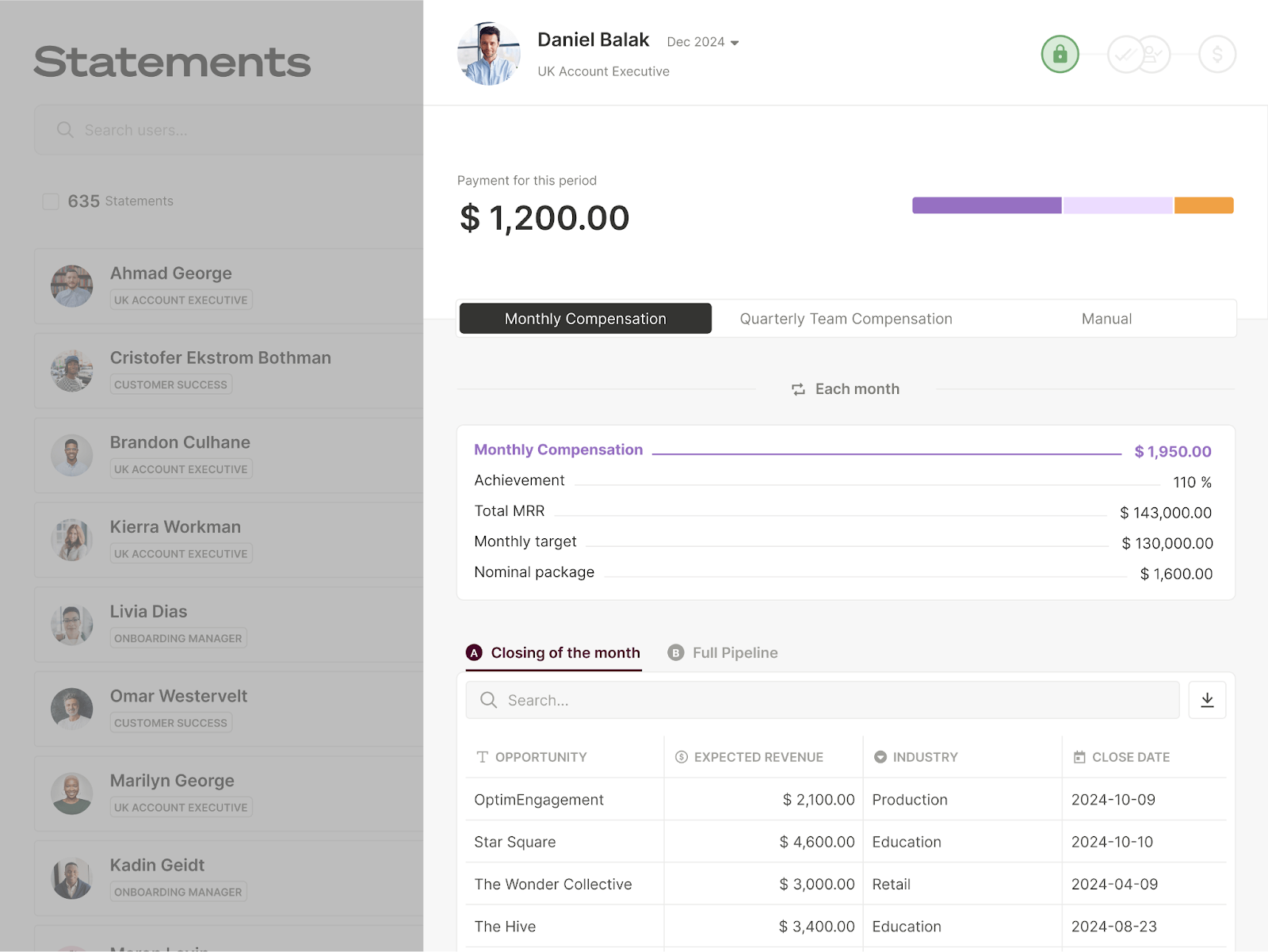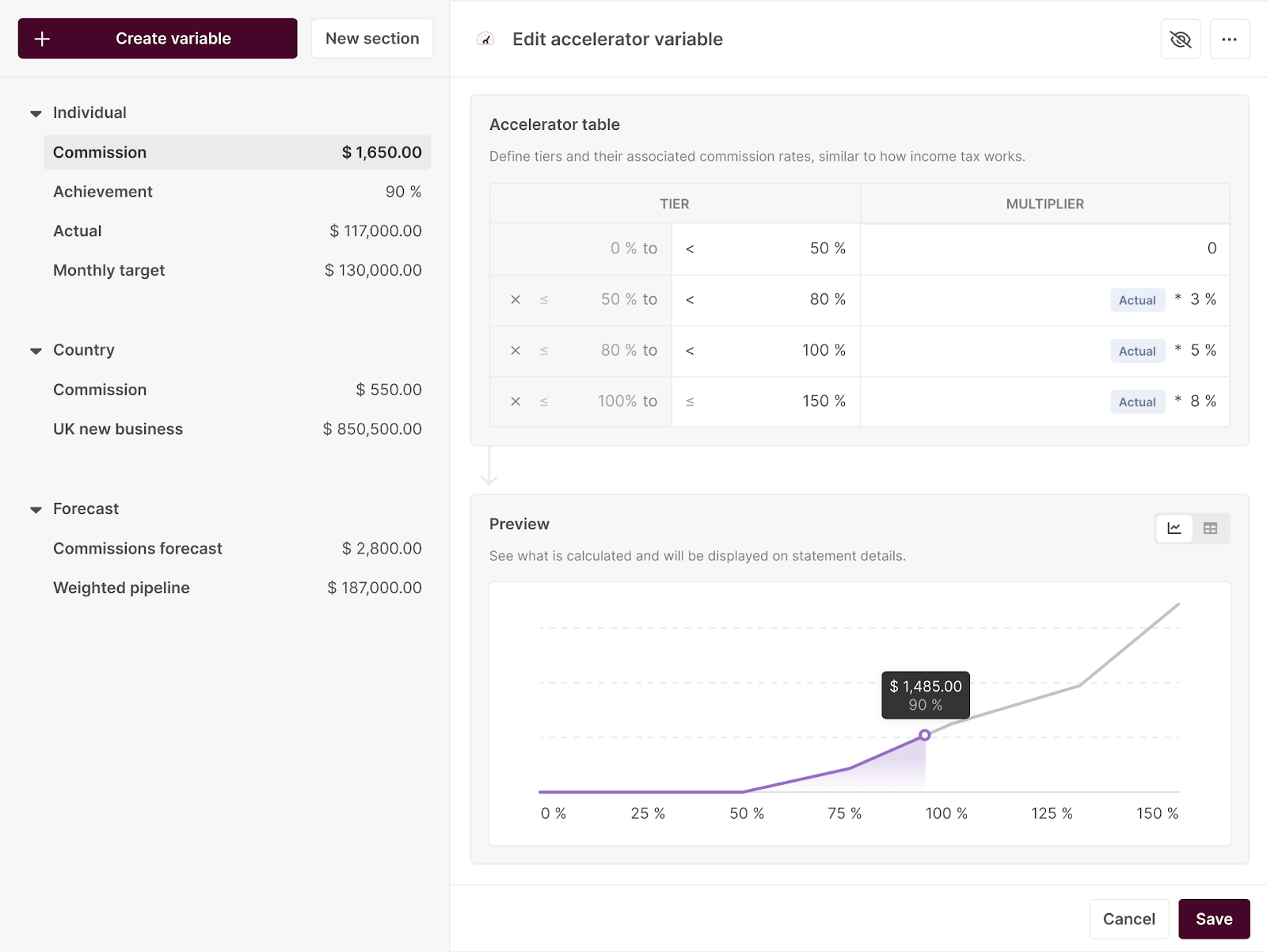Webinar (Wednesday, February 25): RevOps as a Strategic Growth Driver, with n8n, Polaris Ops, and Qobra
RegisterCreating a clear, professional document that breaks down sales commissions for your team can be very complex. You're not alone in wondering how to save hours of manual labor and avoid errors in Excel formulas.
A well-designed commission statement template can be the answer: it streamlines payments, increases transparency and keeps everyone motivated. Whether you're a sales manager, finance professional or business owner, understanding how to leverage and customize these templates will transform your process.
What is a commission statement template?
A commission statement template is a structured document. It is usually a spreadsheet or a form. It records and calculates commission payments for salespeople, brokers or agents. It usually includes fields for :
- Salesperson’s name
- Period covered (month, quarter, year)
- Total sales or revenue generated
- Commission rate or tier
- Commission amount calculated
- Payment date and method
- Notes or adjustments
By using a template rather than creating each statement from scratch, you ensure consistency, reduce errors and facilitate financial reporting.
Why templates matter for commission statements
Creating commission statements manually in Excel or Google Sheets often leads to formula errors, missing entries, or version‑control headaches. A template centralizes all key elements:
- Pre‑built formulas to calculate commissions automatically
- Consistent layout that all users follow
- Ready‑to‑use format for printable PDFs or digital sharing
⚒️ Practical tool
Qobra, our SaaS platform, offers an automated approach that replaces manual spreadsheets with real-time and automated commissions statements. But for teams just starting out, or with simpler needs, we understand that free templates are a quick and flexible solution.

Types of commission statement templates
Depending on your commission plan, you might choose different template structures:
- Salary + Commission
Combines a base salary with a flat percentage on sales. - Tiered Commission
Increases the rate once certain sales thresholds are met (e.g., 5% up to $10k, 7% after). - Draw Against Commission
Advances a fixed amount against future commissions to stabilize income. - Residual Commission
Pays ongoing percentages on recurring revenue (e.g., subscriptions). - Variable Revenue‑Based
Rates vary based on product categories, profit margins, or growth goals. - Variable Profit‑Based
Calculates commissions on profit rather than top‑line revenue. - Territory Volume
Rewards based on total sales within geographic or account groupings.
Each template type addresses specific business objectives—choose the structure that aligns best with your sales strategy.
📌 Note
When you switch from one commission structure to another, ensure your template’s formulas adapt properly—especially if you add new tiers, fields, or rules.

Benefits of using a commission statement template
Implementing a template delivers multiple advantages:
- Time Savings: Automatically compute totals and commissions without manual formula entry.
- Accuracy: Standardized fields and locked formulas reduce human error.
- Transparency: Sales team members can verify their earnings, cutting down disputes.
- Scalability: Easily add new reps, territories, or products by extending table rows.
- Consistency: Uniform statements help finance and HR maintain compliance.
Companies often spend days reconciling commissions each month. By contrast, a ready‑made template or an automated system like Qobra can shrink this process to hours, or even minutes.
Key elements to include in your commission statement
Every effective commission statement should contain these core components:
- Sales Rep Information: Name, ID, department
- Reporting Period: Start and end dates of the statement
- Sales or Revenue Data: Detailed list of transactions, totals, or quotas achieved
- Commission Rates: Flat percentage or tiered structure
- Commission Amount: Calculated payout for each rep
- Deductions & Bonuses: Adjustments for returns, advances, or incentives
- Net Payout: Final amount paid, with payment date and method
- Comments or Notes: Explanations for manual adjustments or policy exceptions
Example Table Layout

A clear layout like this lets everyone grasp the breakdown at a glance.
Customizing your template for specific needs
While templates offer a solid foundation, you’ll likely need to tailor them:
1. Adjust Commission Tiers and Rates
If you operate with a multi‑tiered system, ensure your VLOOKUP or INDEX/MATCH formulas reference the correct range. For example:
=VLOOKUP(TotalSales, $F$10:$H$17, 2, TRUE)*TotalSales
Update $H$17 whenever you add a new tier.
2. Add Custom Data Fields
You may want additional columns such as:
- Product Category: Track commissions
- Client Name: Identify high‑value accounts
- Territory: Group by region for volume plans
3. Implement Conditional Logic
Sheets and Excel let you hide or highlight rows based on conditions. For instance:
- Automatically highlight negative net pay
- Show only unpaid commissions
4. Branding and Formatting
Incorporate your logo, brand colors, and approved fonts. This lends a professional touch, especially when sharing statements with external partners.
💡 Good to know
Use named ranges instead of fixed cell addresses in your formulas. Named ranges (e.g., Commission_Tiers) auto‑expand when you add data, reducing maintenance.
Free commission statement template examples
Browse these sample templates to jump‑start your process:
- Basic Commission Statement (Excel)
Simple flat‑rate calculation - Tiered Commission Tracker (Excel)
Supports up to eight tiers - Draw Against Commission (Excel)
Includes advance and reconciliation - Residual Commission Statement (Excel)
Ideal for subscription‑based revenue
How to create a commission statement from scratch
If you prefer building your own, follow these steps:
- Define Your Commission Policy
Clarify rates, tiers, advances, and bonus criteria. - Set Up Your Spreadsheet
Create header rows (Rep, Period, Sales, Rate, etc.) - Format cells (currency, percentages) - Insert Formulas
Use simple multiplication for flat rates - Apply VLOOKUP or LOOKUP for tiers - Test With Sample Data
Enter mock transactions to verify accuracy. - Lock Formulas and Protect Cells
Prevent accidental edits to calculation cells. - Add Branding
Insert your logo and adjust colors for readability.
⚒️ Practical tool
Using Qobra removes most manual steps: upload your sales data, define rules in our sandbox environment, and generate polished commission letters automatically.

Best practices for effective commission statements
- Maintain Consistent Naming: Ensure salesperson names are identical across all tables to avoid lookup errors.
- Document Your Rules: Keep a reference sheet with all formulas and policies for auditors or new hires.
- Automate Distribution: Use email merges or platforms like Qobra to send statements to each rep securely.
- Regularly Audit Formulas: Double‑check lookup ranges and calculations whenever you update tiers or add fields.
- Backup Your Spreadsheets: Store copies in the cloud or version control to prevent data loss.
Conclusion
A robust commission statement template not only saves time but also builds trust with your sales team by delivering transparent, accurate payouts. Whether you choose a free spreadsheet or move to a dedicated platform like Qobra, the principles remain the same: define clear rules, structure your data logically, and automate wherever possible. Start with a template today and free up more time to focus on growing your business.

FAQ
Where can I find free commission templates?
You can download free Google Sheets and Excel templates from reputable sites like TemplateLab, SlideTeam, or use the examples provided under. Many also offer built‑in formulas and customization guides.
How do I handle returned sales or cancellations in my template?
Add a “Returns” or “Adjustments” column. Subtract this amount from total sales before calculating commissions. Ensure your net sales feed your lookup formulas.
Can I automate commission calculations entirely?
Yes, platforms like Qobra integrate directly with CRMs and databases to calculate commissions in real time, generate statements, and provide dashboards to teams.







